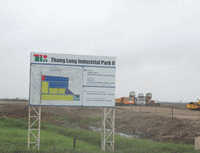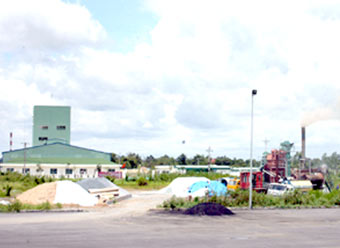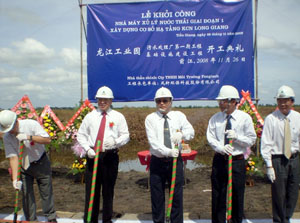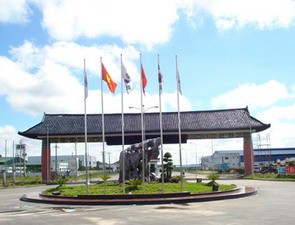CÔNG TY TƯ VẤN QUỐC TẾ ĐÔNG DƯƠNG
Trụ sở chính: 62L/36 Nguyên Hồng, Phường 11, Quận Bình Thạnh, TP.HCM
Văn phòng: Số 48 Đường số 11, Khu phố 6, Phường Hiệp Bình Chánh, Quận Thủ Đức, TP.HCM
®Ghi rõ nguồn : http://viipip.com khi bạn phát hành lại thông tin từ website này.
Giấp phép ICP số 60/GP-TTĐT do Bộ Thông Tin và Truyền Thông cấp ngày 05/04/2010.

hese statutes aim to reduce administrative bureaucracy and mobilise more foreign and local capital into production. For the first time, the laws present a pro-investor approach which will, hopefully, create a new wave of foreign investment into Vietnam.Dr Le Net, partner of LNT & Partners law firm highlights the most important changes in these two laws.
Abolition of Investment Certificates for many foreign invested enterprises
The amended and restated Law on Investment will only require Investment Certificates (IC) for conditional investment projects. Other projects (e.g., production projects) may proceed without an IC. That means foreign investors may establish a company in Vietnam by registering its enterprise and obtaining a Business Registration Certificate (BRC) in the same manner as Vietnamese investors. If implemented properly, many foreign investors will no longer have to prepare feasibility studies and await the opinions of numerous ministries before they can commence operating in Vietnam, thereby removing a critical hurdle in their investment stages.
The possibility of establishing a company without needing a project would promote the concept of a holding company, which has not been widely recognised in Vietnam. It will also make it more possible to establish special purpose vehicles (SPVs) to acquire assets/projects in Vietnam without having to enter into a joint venture or acquiring shares in a local company. This significantly reduces transaction costs.
Abolition of the “ultra vires” doctrine and HS Code requirements
The amended and restated Law on Enterprises (RLOE) will abolish the need to provide HS Codes when obtaining a BRC. This allows an enterprise to have as many business activities as it wishes, provided they are not prohibited or restricted by law. Trading and distribution companies will no longer need to supply thousands of HS Codes for their traded and anticipated products. This will answer the common investor complaints on HS Code requirements and the irrelevant questions being asked by authorities in the licensing stages.
The opening up of a HS Code system and the list of business activities may lead the way to relaxing the ultra vires doctrine – that an enterprise may only bind or be bound if it is engaged in the businesses listed in its BRC. This will provide greater certainty to businesses in respect of their trading partner’s capacity.
Reduction of 65 per cent majority vote to 51 per cent majority vote, and 75 per cent majority vote to 65 per cent majority vote
While this change may not affect existing companies with their current charters, it opens up opportunities to renegotiate the charter for the shareholders’ benefit and attracts more investors to buy-in shares to reach the required control majority.
Derivative actions: booster to private equity
While the LOE introduced the concept of fiduciary duty, it does not implement it as a means of protecting minority shareholders if such duty is violated. For the first time, the RLOE introduces the concept of derivative actions, which allows shareholders holding at least 1 per cent of the total shares to launch derivative actions against board members, directors and controllers from a violation of their duty to put the company’s interests before their own and not to abuse their powers. The cost of derivative action will be borne by the company. This can be considered good news for private equity funds or minority investors, who currently hesitate to participate in equalisation programs of state owned enterprises (SOEs) because the major shareholders will be the government or a relative of the SOE’s incumbent managers.
Corporate bonds: booster of securitisation
The RLOE recognises a company’s right to issue bonds. Unlike previous legislation, which requires the bond issuer to be “profitable”, which may be unfeasible to SPVs, the RLOE only requires the issuer to be solvent (i.e., able to pay its debts when due). This deregulation may create opportunities for securitisation and a project bonds market, and is a step towards the right direction in advancing Vietnam’s capital markets.
More than one legal representative in a company
Foreign investors sometimes express concerns over the concept of “legal representative” of a company in Vietnam, as this is the only person that can bind the acts of the company. Often, dismissal of the legal representative becomes a long-term dispute between shareholders or third parties who become surprised when the director signing the contract is actually not a legal representative. The RLOE envisions that a company may have more than one legal representative and more than one chop, which aims to do away the classic shareholders’ conflict among local enterprises and align the LOE with the rest of the world.
Charter capital will be paid up capital
In the past, the Vietnamese authorities often measure the capacity of a company by its “charter capital”. Understanding this misconception, many companies have been established with a very high declared charter capital which never been paid up. To counter this problem, the RLOE now provides that charter capital must be paid up capital to be fully contributed within 90 days from its establishment. Other than paid up capital, there may be authorised capital but this would not be considered charter capital. Any issue of shares beyond the authorised capital should either comply with the public offerings process (registration at the State Securities Commission) or private placement (notice to the business registration authority).
Obstacles to change - “conditional projects” and delays in consideration
The abolition of the IC requirement does not benefit all foreign investors. There are more than 150 “conditional” projects that are still subject to IC requirements. These include services under the WTO roadmap such as retail and distribution, logistics, and pharmaceutical trading. Unfortunately, foreign investors in these business lines tend to face the greatest licensing issues.
For trading and distribution, all restrictions and conditions should be removed. In order to develop a production base, foreign investors should be allowed to test the market and introduce their distribution network. The restriction of foreign trading and distribution not only compromises the effectiveness of the ASEAN Economy Community (to be implemented in 2015), but also harms effective local distributors in the long-run.
Another bureaucratic problem is that although the law provides 45 days for authorities to consider an application and issue an IC, authorities often do not respect this timeframe and it goes unsanctioned. Business societies and law firms may want to lobby the drafting committees to impose a requirement that if the licensing authority requests an opinion from a central ministry, and no reply is provided within 14 days, the licensing authority may assume the ministry has no objections.
As experience shows in the past seven years (when Vietnam joined the WTO), unless the business community voices their concerns, the drafting committees may face stronger challenges from the ministries for various reasons and may, in the end, forfeit their initial good intentions.
Support from the business community
The reforms to the LOI and LOE will considerably impact the Vietnamese legal community. They will facilitate the establishment of new enterprises, especially those owned by foreign investors, and reduce costs when investors withdraw from the Vietnamese market. In addition, it will preserve the rights and interests of investors, shareholders and other stakeholders.
So far, the drafting committees have only received modest support from VBF through organising seminars. It is now time for business societies and law firms to join support, either by submitting position papers or providing examples of technical barriers to the press and the National Assembly, to enable the drafts to be supplemented and completed. Only then will the target of these two vital laws be achieved.
LNT & Partners wins coveted ALB Award
LNT & Partners was just honoured the title “Vietnam Deal Firm of the Year” by Asian Legal Business (ALB), a Thomson Reuters company, which recognises the excellence and achievements of Southeast Asia’s leading law firms and top dealmakers.
Competing against eleven well-established international and local law firms in Vietnam, LNT & Partners won the award after a rigorous review process wherein the firm’s representative deals were deemed among the most complex, innovative, and significant in Vietnam.
LNT & Partners is only the third local law firm to win this award in its ten year history.
The award is among the most prestigious in the legal industry, as they reward the strongest performing law firms in the region.
The firm’s managing partner Hoang Nguyen Ha Quyen said “Last year was a pivotal year for us. We are extremely grateful for our clients’ support who continued to entrust many of their most significant deals in our care during a critical year of growth for the firm.”
“Many of the real estate and infrastructure deals are fraught with legal traps. This award is a testament to the trust our clients have placed in us to help guide them through the legal minefield of developing land in Vietnam,” Binh Tran, the head of the firm’s Real Estate & Infrastructure Practice Group noted.
US-based Thomson Reuters Corporation is a world’s leading source of intelligent information for businesses and professionals.
- Chính phủ cam kết đầu tư phát triển ngành công nghiệp vi mạch bán dẫn (11/6/2023 1:06:39 PM)
- 11 chart cho thấy Việt Nam đang vươn mình, lột xác, lấy lại hào quang chiến thắng, trở thành công xưởng sản xuất công nghệ của thế giới (7/21/2022 5:28:21 PM)
- Công bố danh mục 10 cảng cạn Việt Nam (7/21/2022 5:25:08 PM)
- FDI năm 2022: tiếp xu hướng chất lẫn lượng? (1/20/2022 11:16:12 AM)
- Bức tranh kinh tế vĩ mô năm 2021 và dự báo năm 2022 (1/20/2022 11:03:08 AM)
- Singapore rót vốn FDI vào Việt Nam nhiều nhất trong 8 tháng qua (8/29/2021 10:53:54 AM)
- Khái quát về sự phát triển các khu kinh tế tự do trên thế giới và một số kiến nghị đối với Việt Nam (7/12/2021 10:12:39 AM)
- THEO DÕI TÌNH HÌNH XUẤT NHẬP KHẨU HÀNG HÓA CÁC THÁNG (5/19/2021 10:33:38 AM)
- Đầu năm 2021: Đối tác Apple, Tập đoàn LG đầu tư hơn 1,3 tỷ USD vào Việt Nam (2/17/2021 10:52:05 AM)
- Chuyển đổi nhiên liệu cho Trung tâm Điện lực Tân Phước và Long An (11/5/2020 8:42:08 AM)
- Trình phê duyệt sân bay Quảng Trị với mức đầu tư hơn 8.000 tỷ đồng (10/18/2020 9:13:16 AM)
- 18.000 tỷ đồng xây cao tốc từ Đồng Nai đến Bảo Lộc (10/18/2020 8:59:50 AM)
- Doanh nghiệp Nhật Bản sắp đầu tư hơn 2 tỷ USD vào Việt Nam (10/18/2020 8:58:54 AM)
- Việt Nam sẽ là một trong những trung tâm sản xuất laptop chủ chốt vào năm 2030 (9/28/2020 9:15:35 AM)
- HSBC: Việt Nam sẽ là quốc gia ASEAN duy nhất tăng trưởng dương năm nay và bứt lên 8,5% trong năm 2021 (8/17/2020 12:11:14 PM)

- Chính phủ cam kết đầu tư phát triển ngành công nghiệp vi mạch bán dẫn
- 11 chart cho thấy Việt Nam đang vươn mình, lột xác, lấy lại hào quang chiến thắng, trở thành công xưởng sản xuất công nghệ của thế giới
- Công bố danh mục 10 cảng cạn Việt Nam
- FDI năm 2022: tiếp xu hướng chất lẫn lượng?
- Bức tranh kinh tế vĩ mô năm 2021 và dự báo năm 2022
-
 Mekong Air: Hãng tư nhân thứ ba được chính phủ chọn phát triển ngành hàng không VN
Mekong Air: Hãng tư nhân thứ ba được chính phủ chọn phát triển ngành hàng không VN
-
 Hưng Yên: Khu công nghiệp Thăng Long II tiếp nhận 7 dự án đầu tư nước ngoài
Hưng Yên: Khu công nghiệp Thăng Long II tiếp nhận 7 dự án đầu tư nước ngoài
-
 Khu công nghiệp Sa Đéc (Đồng Tháp) thu hút nhiều dự án đầu tư
Khu công nghiệp Sa Đéc (Đồng Tháp) thu hút nhiều dự án đầu tư
-
 KCN Long Giang – Khởi công xây dựng Nhà máy xử lý nước thải 3,3 triệu USD
KCN Long Giang – Khởi công xây dựng Nhà máy xử lý nước thải 3,3 triệu USD
-
 Bình Phước: KCN Minh Hưng - Hàn Quốc ô nhiễm môi trường
Bình Phước: KCN Minh Hưng - Hàn Quốc ô nhiễm môi trường










